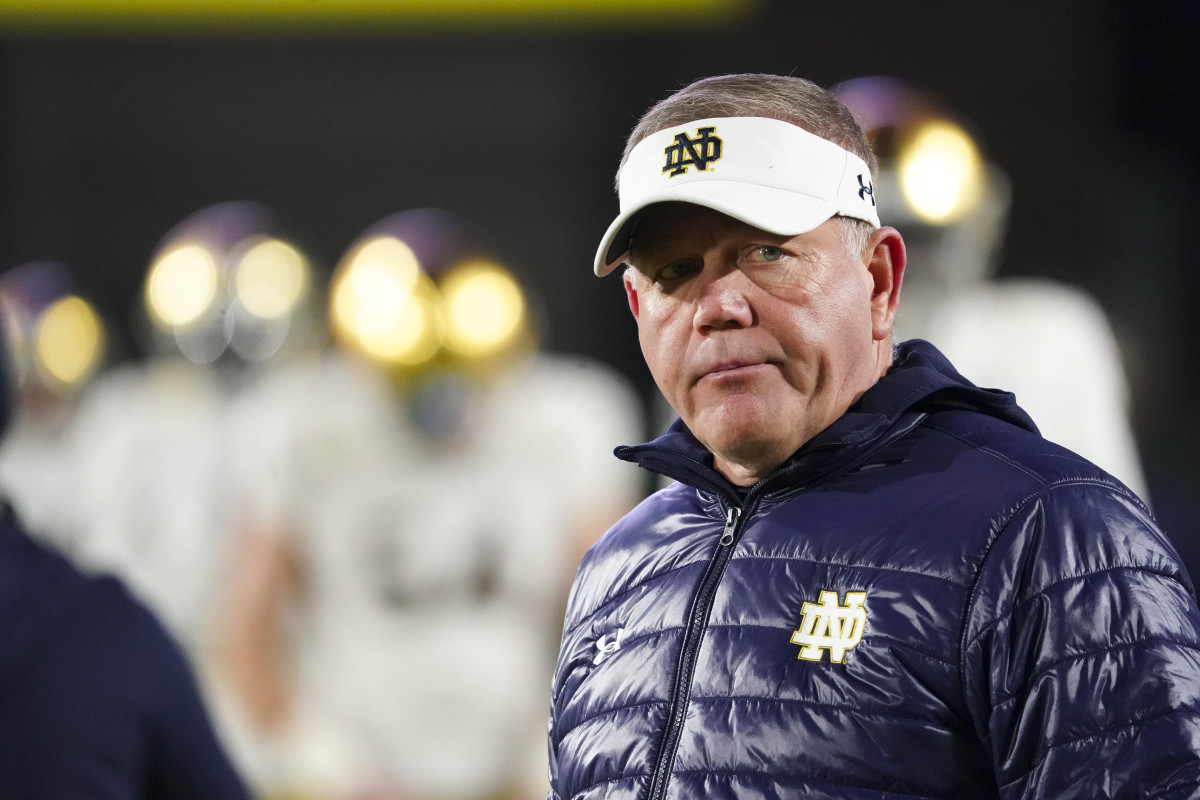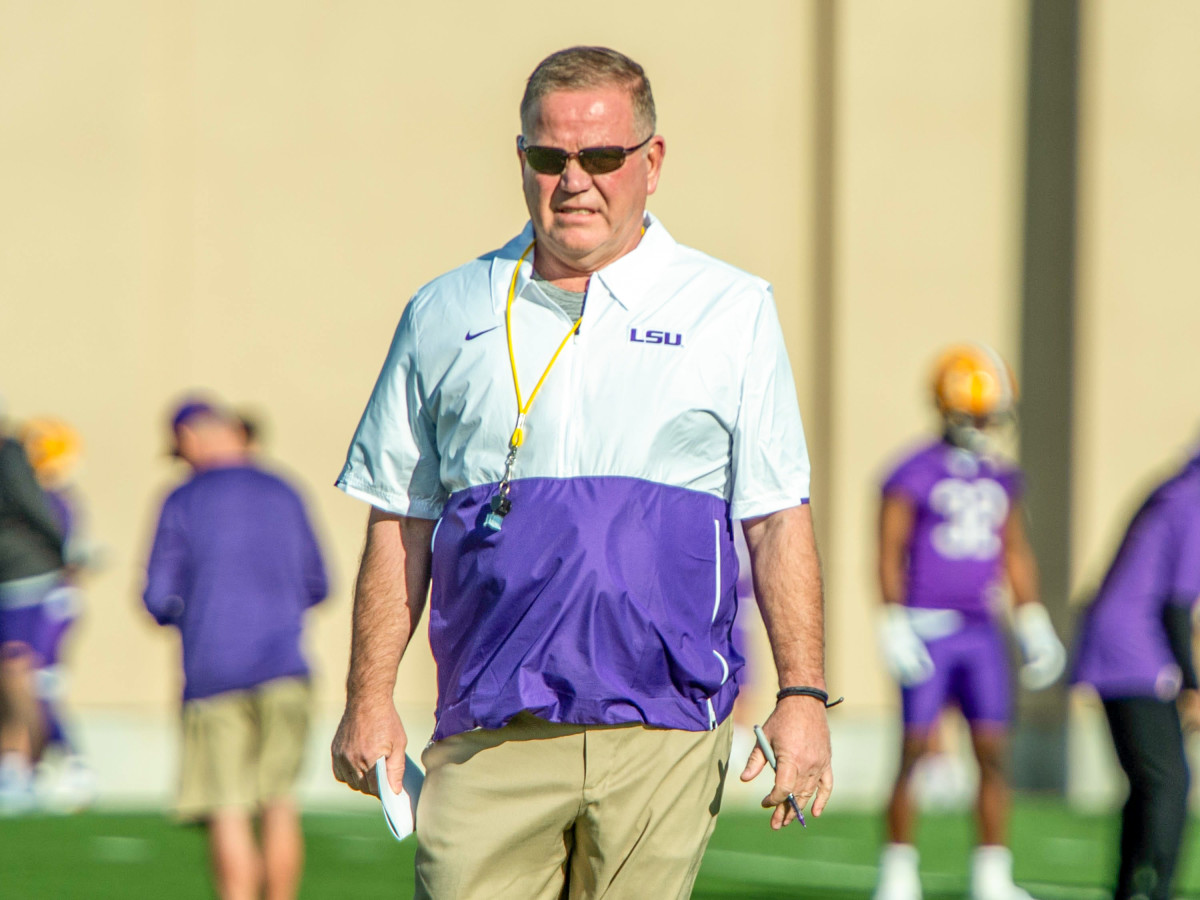Brian Kelly, LSU and a $100 Million Gamble
As soon as Brian Kelly walked into the home of star offensive line recruit Will Campbell, he smelled Louisiana.
The spicy goodness emanating from the kitchen, Kelly turned to Campbell’s mother and quipped, “You must have been cooking all day!”
Holly Campbell quickly corrected the coach. “No, sir, but my husband has.”
Her husband, a 6'5", 280-pound man nicknamed “Bull,” glared at Kelly from across the living room. That’s when the coach knew he had mucked it up.
“Just for me to make that assumption,” Kelly says disappointingly while retelling the tale. “He was offended and goes, ‘Let me explain this to you. It’s a Magnalite pot, and you can’t get these everywhere, and yeah, I’ve been cooking this roux all day!’”

What a way to kick off my tenure at LSU, Kelly thought, insulting the father of a highly ranked high school prospect.
Will eventually signed with the Tigers and Bull Campbell put the incident behind him.
“We rednecks can cook, too, at least some of us,” Bull says in his Southern twang. “We had a few beers. They stayed for about 90 minutes, long enough to eat up some étouffée.”
Campbell escorted Kelly to his backyard, where a group of neighborhood kids was playing tackle football. Bull gestured toward them and looked at Kelly, “This is Louisiana,” he told him.
“Dad is cooking crawfish, and kids are playing football,” Kelly recalls. “Food, family and football. All the things we’re looking for, we got in that family. The education and adjustment for me has been really cool. It hasn’t been a culture shock like, ‘Oh, my God, this is crazy!’ It’s been much more like, ‘This is cool.’”
When he returned to Baton Rouge, an elated Kelly phoned his wife to retell the story of the gigantic man cooking a roux and kids outside playing football in 50-degree temperatures in December.
“This,” he told her, “is going to work out really well.”
In one of the most unique coaching transitions in the history of college football, a man many regard as the polar opposite to his predecessor, Ed Orgeron, now sits on one of the sport’s richest thrones through a pair of unprecedented moves: The coach who was fired 21 months after winning a national title, one of the quickest performance-based dismissals in the sport, was replaced by a man who became the first Notre Dame coach in more than 100 years to leave for another college job on his own volition.
Change is everywhere here.
Just paces from the entrance to LSU’s football operations building, a sleek, black Tesla sits in the spot reserved for Kelly. It is decidedly different from what previously occupied the space, a gas-guzzling Denali or Hummer driven by Orgeron. Stripped from the facility’s walls are any references to Orgeron’s oft-used slogan, “One Team One Heartbeat.” Within the building’s offices, Kelly cleaned house—excluding equipment and athletic trainers, he kept fewer than five staff members and hired 48 new ones. Kelly even reconfigured the head coach’s suite, shifting furniture around so his desk now sits in an area the previous coach used as a weight room—more evidence of the disparity between the two men.
Kelly preaches “standards” instead of “culture.” He is tightening up the program, using a business-like approach that partially stems from his past life as a political campaign aide, not necessarily the quintessential football guy like LSU’s past two coaches. One player recently jammed to loud music while strutting down the facility’s hallways. “Better turn that down,” a staff member warned him. “We don’t do that here anymore.” A few players who were late for Kelly’s first team meeting and for winter workouts are no longer on the team.
Around the country and across social media, the buzz around Kelly’s hiring has centered on his massive contract, along with quizzical responses over his accent, his dance moves and his peculiar fit on the bayou as a career-long Midwestern coach with New England roots. Those within the building that we spoke with, Kelly included, have seen and heard the jokes and jabs. Some laugh. Others shrug. A few were angered.

Kelly shrugs all of it off.
“Everyone is like, ‘Aw, it’s going to be this white guy from the Midwest going down there and it’s going to be crazy!’” Kelly says. “There’s a little more spice to the food, maybe a little bit more roux than I’m used to, but it hasn’t really been an adjustment that I’ve felt like this is really outside of my comfort zone.”
He believes the root of the criticism is his unpopular and unexpected departure from South Bend. But Kelly is on to a new challenge, competing in arguably the most difficult conference in college football, the SEC, in pursuit of the one thing missing from his trophy case: a major college national championship.
Will the move be worth it in the end? Will this outsider fit in at a place so culturally different from the Midwest, where he previously spent his entire career?
“If Coach Kelly wins, they’re going to embrace him like Nick Saban. Nick Saban is from West Virginia and coached at Michigan State before he got [to LSU],” says Bobby Hebert, a bayou-bred Louisianian and sports talk-show host in New Orleans. “If he doesn’t win,” Herbert says in his Cajun twang, “they’ll tell him, ‘Yankee, go home!’”
Brady Quinn first met Brian Kelly in 2010 during an event at Mile High Stadium after the then newly minted Irish coach spoke to the Notre Dame Club of Denver.
Quinn, fresh off a trade from the Browns to the Broncos, recalls being struck by Kelly’s savvy ability as a public speaker. “He knows how to work a room.” Kelly isn’t necessarily a chatty person, but the two stayed in contact, would text now and then, and see each other at charity events.
But since Kelly left for LSU, Quinn is one of many Golden Domers who has publicly chided the coach for his exit from South Bend.
It’s not that he left, Quinn says, but how and when. Kelly left for LSU six days before the release of the final College Football Playoff rankings. The Irish finished one spot out of the final four, but if they made it, Notre Dame would have played a playoff game without their head coach.
“That’s where I think it hurt people around the program. It was hard to grasp not waiting a week,” Quinn says. “He left the university in a better place than when he found it. He won the most games as any Notre Dame coach. There’s something to be said for that. But some of it now seems disingenuous. A big contract flashes in front of your face and you go?
“Anyone who has suffered a heartbreak in a relationship knows that you remember how it ended,” Quinn adds. “Where was LSU going to turn if they didn’t go get Brian Kelly? He doesn’t have control over the timing of all that? He could have waited.”
Kelly suggests the school would have moved on to other candidates had he requested to delay his decision.
“Everybody is like, ‘How can you leave your team?!’ LSU controlled the timeline,” he says. “It wasn’t the Brian Kelly timeline. The Brian Kelly timeline would have been, ‘Hey, can you wait for me? Hold the job open? Because I’d like to hang around Notre Dame until we know what’s going on [with the rankings].’’’

Kelly’s exit sparked many Notre Dame alums and former players to jump out of his corner quickly, says Eric Hansen, a writer at Inside ND Sports who has covered the Irish since 1997. Those who publicly supported and defended the coach over his 12-year tenure in South Bend are now skewering him on radio and television shows. Mike Golic Jr., a TV and radio analyst who played for Kelly in South Bend, describes his departure as a shock wave that washed over Golden Domers everywhere. “We’re used to being the ones that people leave someone else to come to,” he says.
Some were left feeling bamboozled. Many hold the perception that Kelly gave up on Notre Dame winning a national championship. For years, Kelly fought for stadium improvements and facilities upgrades in an effort to reach the summit, Hansen says.
“He was never going to let go of that concept,” Hansen says, “and then he did.”
Kelly says he did not give up on winning it all in South Bend and believes there’s more left to do there.
“I never went into the office saying we can’t [win a title],” he says. “I went into the office every day looking for the reason we could. But part of the lure of this job is there are many more avenues toward that. There are not as many paths at Notre Dame. I’m not trying to skirt the answer as much as I really believed, for me, it wasn’t ‘I’m done here.’”
He and his wife, Paqui (pronounced POCK-ee, a Spanish nickname meaning “happy”), had even recently built a home in South Bend just off Notre Dame Avenue, not far from Knute Rockne’s original house. He termed it their “forever home.”
He won the most games as any Notre Dame coach. There’s something to be said for that. But some of it seems disingenuous. A big contract flashes in front of your face and you go? — Brady Quinn
That home is now for sale.
“I could have retired there,” he says.
So why leave?
For one, Kelly’s contract is one of the most lucrative in the sport, paying him an average of $10 million a year for 10 years with 90% of it fully guaranteed. It also includes some tasty incentives, such as 50 hours of annual private jet time and a $500,000 bonus each year if LSU qualifies for a bowl game.
Kelly is 60 years old, is in his 32nd season as a head coach and is with his fifth different program. If not take this leap now, then when? He was looking for “one more challenge,” he says.
“What’s left for him to do in his career? Win a national title,” says Chuck Martin, the coach at Miami (Ohio) who spent eight years on Kelly’s staff at Notre Dame and Grand Valley State. “Other than that, he’s done everything you could ever do.”
The move was made easier in that he and wife are now empty-nesters. Their daughter, Grace, is a senior at Notre Dame, while their oldest son, Patrick, is finishing his degree at Grand Valley State before he plans to join dad as an offensive graduate assistant, and youngest son, Kenzel, is a sophomore football player at Grand Valley State.
Paqui had to be on board with the move, too. She is a two-time breast cancer survivor, so Kelly says it was predictable that she wanted to attack the new challenge head-on. “She’s not one to back down,” he adds.
Some also believe the impact academic standards and rigid admissions have had on the program’s success over the years was a final straw in pushing Kelly to leave.
The school hasn’t won a title since 1988 and has cycled through six coaches during that span. In some of its biggest games, Notre Dame has wilted. The program has lost 10 straight BCS/CFP postseason games or New Year’s Six bowls, with their last win coming in ’93. Under Kelly, they lost four of those games: against Alabama twice (2020 CFP semifinal and ’12 BCS championship game), Clemson (’18 CFP semifinal) and Ohio State (’15 Fiesta Bowl). In addition, they lost two regular-season games against Georgia in ’17 and ’19.
Alabama, Clemson, Ohio State and Georgia have something in common, says Al McKellar, a longtime friend of Kelly’s who worked with him at Grand Valley State and now operates an analytical recruiting service. “Guess where the kids who can’t handle academics at Notre Dame go? Where do they end up?” asks McKellar. “The Alabamas, Georgias, Clemsons. It’s about a difference-maker. At Notre Dame, my difference-maker can’t get in. It’s not that he’s a bad kid or dumb kid. They don’t feel he’ll be successful enough because of the time constraints and academic pressures. The frustration sets in.”

But it’s not only academics, says Brian Polian, LSU’s recruiting and special teams coordinator who has worked for Kelly the past five years. It’s resourcing and facilities, as well.
“I’ll say, I used to hear about the changes we needed to make at Notre Dame in our facility, the way we fed the team, the way they lived,” he says. “I used to think to myself, ‘I think we’ve got it pretty good.’ Then I came down here and I thought, ‘Oh my!’ This is dramatically different.”
Kelly and his staff don’t have to spend as much time crisscrossing the country to recruit. They’ll focus on Louisiana, the Houston area and targeted spots in Georgia and Florida, such as Atlanta and Miami. It’s warmer here, too, an important perk for someone who is an avid golfer. (Kelly has played Augusta National a few times.) The Southern shift also gets the Kellys closer to one of their two vacation homes on the west coast of Florida, now just a 90-minute jet ride across the Gulf of Mexico.
But this move centered on winning it all. However, not everyone believes Kelly’s path to a national championship will be easier in Baton Rouge. While LSU’s more relaxed academic admissions program makes it easier to add more talent, those athletes must be monitored more closely than players at Notre Dame. Did they attend class? Are they academically eligible?
“The kids you’d admit at Notre Dame, the [admissions] people look at them and say, ‘This child has a good chance to graduate.’ That’s not the case at LSU,” says Gerry DiNardo, who was LSU’s coach from 1995 to ’99 after a stint at a high-caliber academic institution, Vanderbilt. “You have a bigger responsibility at LSU because of the kids and their academics. Because of Notre Dame’s schedule, you’re going to have better players than the majority of teams you play. At LSU, there are six teams in your conference that have a national championship roster.”
But if history is a guide, his odds are favorable in reaching the apex of college football. Over the past 19 years in Baton Rouge, three different coaches have won it all, a stat that no other program can claim. LSU has near-limitless resources, one of the best regional recruiting footprints in the country and an unrivaled game-day environment. But not everything is rosy. For more than three years and counting, the school has been the subject of two separate investigations—one digging into Title IX and sexual misconduct allegations within the athletic department, and the other over NCAA violations tied to football and basketball that may soon result in serious sanctions.
On the field, Kelly takes over a program that is 11–12 over the past two seasons and has won eight of its past 18 SEC games, a spiral that began after the school rode quarterback Joe Burrow to the 2019 championship. When he arrived in December, Kelly’s first mission was to change players’ habits and behaviors, create better communication among the staff and establish more organization. These things take time, something Kelly acknowledges he doesn’t have.
“This is not, ‘Hey, Coach, come on down to LSU. We play in the SEC West. Take your time,’” he says. “The health of any program is generally about organizational health, which is communication and collaboration. Organizational health here was probably as poor as I’ve seen it.”
Kelly is a whiz at such things, says Martin. In his more than 30 years as a coach, Martin says he has never worked for someone who is better at the off-the-field aspects than Kelly. “He can see the situation and run the company better than anyone else.” It’s a talent that is likely a partial byproduct of Kelly’s love of politics—he studied the subject seriously enough that he worked as a presidential campaign aide for Colorado Senator Gary Hart and was a delegate at the 1984 Democratic National Convention.
Another factor is his experience. His coaching rise was not meteoric; it took a 13-year stint and two Division II national titles at Grand Valley State before he landed a job in the Mid-American Conference. Then came six more years of winning (he won 70% of his games at Central Michigan and Cincinnati) before becoming a major college coach at Notre Dame in 2010.

Today, he has the fourth-most victories (166) of any active major college football coach, trailing only Nick Saban (274), Mack Brown (259) and Kirk Ferentz (178). He became the winningest coach in Notre Dame’s illustrious history last season, an incredible accomplishment that is notably lacking one feature.
“He did it without winning a national championship,” Golic Jr. says. “At Notre Dame, that’s when they build statues outside of the stadium for you—when you win national championships.”
Longtime LSU followers not only hope Kelly can stabilize the internal aspects of the program but can also restore order at two positions: offensive line and quarterback. The state of Louisiana churns out some of the nation’s best skill players but falls short in consistently producing big bodies and big arms.
“Every time we get a good, big one, it seems like they come from north Louisiana and Saban gets ’em,” says Dean Blanchard, an LSU booster and Louisiana native.
Kelly acknowledges what’s become a thorn in the program’s side for years now—LSU’s former coach, Saban, plucking some of Louisiana’s best players. In fact, over the past 11 signing classes, Alabama has signed 16 top-10 Louisiana players. In two of those years, Alabama signed the top player in the state, including this past class.
“From Monroe to Shreveport, those are the areas where we have to be better,” Kelly says. “That commitment you’ll see. We’ll have a presence out there.”
Kelly’s transition signing class ranked 12th nationally—a strong start but one diminished by this nugget: The class ranked third in LSU’s own division.
Welcome to life in the SEC West.

Brian Kelly’s friends say he is a big foodie. He likes a nice red wine and has a refined palate, something Gino Marino realized during one of Kelly’s recent visits to his Italian restaurant, Gino’s, in Baton Rouge.
Marino made an Italian dessert, a cannoli, especially for Kelly. Cannoli in the United States are often made with cow’s milk, but the authentic version of the Italian dessert is made from sheep’s milk. Marino served the homemade treat to Kelly. He bit into it, looked at the owner and said, “Hey, that’s the real thing—it’s sheep’s milk!”
“It blew me away,” Marino says.
He knows that outsiders don’t immediately adapt to the way things are done in Louisiana. But you know what cures that? “You win,” Marino says with a laugh.
Many believe Kelly is destined to do so, even those who are no longer in his corner.
“Ed Orgeron and Les Miles—no disrespect to them, but he’s a better coach than them and they won national championships there,” Quinn says. “I just hope he can drop the Southern accent and stop the dancing with recruits.”
Quinn isn’t the only one who has paid attention to the coach’s change of venue. The college football world seems fascinated by the combination of Kelly and Louisiana, more so than other high-profile offseason coaching moves, like Lincoln Riley’s shift to USC or Mario Cristobal’s move to Miami.
And Kelly’s first couple of months in Baton Rouge have provided more fuel to that fire of curiosity. First, the way he pronounced the word family (FAM-uh-lee) during a speech at an LSU basketball game with a sudden Southern tinge. Kelly says the accent debacle was blown out of proportion and that he normally pronounces the word that way.
And what of the dancing with tight end recruit Danny Lewis on a spinning apparatus, the coach awkwardly squatting and using moves from the movie Pulp Fiction? The kid wanted to dance, Kelly says. What good recruiter declines such a request from a recruit? (Lewis wound up signing with … Alabama.)
The education and adjustment for me has been really cool. It hasn’t been a culture shock like, ‘Oh, my God, this is crazy!’ — Brian Kelly
“Now, I know I’m a sh---y dancer, but it’s not for anybody else except the kid,” Kelly says. “It’s for them. I don’t really care what other people are thinking, as long as that kid was having fun with it. Now it’s like every kid who comes on campus says, ‘Coach, you gonna dance?! Are we dancin’?!’ I say, ‘Only if you’re committin’.’”
Not everyone inside the LSU football building took it in stride. Polian says his boss was treated unfairly. Some chalk it up to Kelly’s leaving one nationally hated big brand for an equally disliked conference.
“Enough was enough,” says Polian. “That said, this is the life we chose. It’s the era we live in where so many people have such strong opinions yet they hide behind keyboards and avatars, and you don’t know their real names and they spew vitriol.”
Some of their real names are known, of course, including one of Kelly’s SEC colleagues. Ole Miss coach Lane Kiffin tweeted at the coach, asking whether his dance moves were a result of losing a bet.
In a way, LSU is leaning into it. Kelly’s dancing video with Lewis drew thousands of views. Sports Business Journal named LSU’s football Twitter account the best in sports social media in 2019, and the Tigers have consistently finished within the top three of SBJ’s list of accounts that gain the most interactions in the space.
“I see everybody paying attention,” says Ira Childress, LSU’s player relations director who played for Kelly at Grand Valley State.
For better or worse, the spotlight seems focused on Kelly and his new home. Is it an unusual arrangement? Maybe. Is it an odd fit? Sure. And did he muck up one of his first recruiting visits in Louisiana with a man named Bull? Yep.
“It’s like if somebody from Louisiana was in Nebraska or something,” Hebert says. “The jury is still out on him. One thing about Coach Kelly is, it’s his way. As long as you’re winning, hey, everybody is for it. He’d be one to me that would go to a crawfish boil, not understanding it, and if LSU is winning, he’d wave to everybody and leave.
“If they’re not winning, you gotta go to the crawfish boil and eat crawfish.”
More College Football Coverage:
